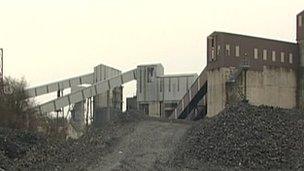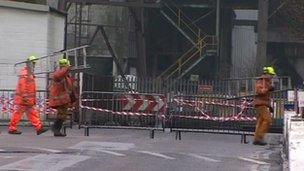Daw Mill Colliery fire out as redundancy row heats-up
- Published
- comments

Daw Mill Colliery was affected by a huge fire in May
For proof of the old adage that "troubles never come singly", look no further than Daw Mill Colliery near Coleshill in north Warwickshire.
What began as a sequence of unwelcome "knock-on" events at the Midlands' last remaining deep coal mine has escalated into a catalogue of cascading catastrophes.
Even before last February's disastrous underground fire, the colliery had been earmarked for possible closure next year. The international price has been falling because of coal flooding into the market from the US, where the dash for shale gas is transforming the energy market.
Factor-in that "spontaneous combustion" four months ago and you have the underground equivalent of a "perfect storm".
It has cost UK Coal a third of its business: it produced 2.2m tonnes last year out of UK Coal's total of 8m tonnes.
The fire started in the worst possible place, near where most of the equipment was kept. It is also happens to be the area which has an additional flow of oxygen which in turn gave the flames an extra boost.
UK Coal estimates the total cost at a staggering £300m - £160m for the coal itself, £100m for the equipment plus nearly £40m to close it down.
Pensions fear
And close down Daw Mill surely will: reopening it would cost at least £100m more.
Since the fire, UK Coal has moved 120 of the Daw Mill workers to other deep mines. But it says 350 others for whom it has yet to find work are at home on 60% pay.
Just to compound the uncertainty hanging over them, it is unclear whether or not they would receive the enhanced redundancy terms they had been expecting, or merely the basic statutory payments. Someone with 35 years service would get £31,500 under the enhanced scheme compared with just £12,500 under the state scheme.
But it doesn't end there.
UK Coal's pension fund has a deficit of half a billion pounds. Following a restructuring last year, it was spilt between their property and mining businesses.
Now there are mounting fears that the former Daw Mill workers will end up with far less generous pensions than they had bargained for.

It was one of the last operating deep coal mines in the UK
Negotiations between UK Coal, the pensions regulator and the Pension Protection Fund (PPF) are understood to be at an advanced stage.
The Union of Democratic Mineworkers says all the uncertainty is wearing its members down. Many of them find themselves in a kind of Catch 22, they want to find new jobs but fear their benefits and redundancy terms could suffer if they do.
The company's chief executive Kevin McCullough says his main focus is "preserving 2,000 jobs and securing the future of UK coal mining".
He told BBC News he remained confident they they had "an underlying profitable business".
UK Coal still has deep mines at Kellingley in Yorkshire and Thoresby in Nottinghamshire as well as six surface mines.
Whatever the future of UK Coal, until new sources of energy are delivered, we will become ever more dependent on imported coal, especially from Russia, Colombia and South Africa.
And hundreds more British miners will leave the industry for good.